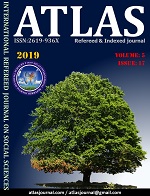EFFECTS OF CİRCADİAN RHYTHM, SLEEP AND NUTRİTİON ON OBESİTY
DOI:
https://doi.org/10.31568/atlas.297Keywords:
Circadian, chrono-nutrition, obesity, sleep disordersAbstract
Obesity, which can play a key role in the development of many diseases including diabetes, cardiovascular diseases, cancer and respiratory system diseases. It is known that many factors such as still lifestyle, excessive and incorrect eating habits, hormonal and metabolic factors can pave the way for obesity. In addition, circadian rhythm disorders, which are important biological regulators in all organisms, from single-celled organisms to humans, are thought to cause an increase in obesity prevalence. The most beautiful example of circadian rhythms, also called biological rhythms with an average 24-hour cycle, is the sleep-wake cycle of the person. In this review, the effects of circadian rhythm, sleep and nutrition on obesity formation were investigated. Circadian rhythms controlled by Suprachiasmatic Nucleus (SKN) at the front of the brain are endogenous mechanisms, which are usually independent of external factors, although they are affected by environmental conditions such as day-night, summer and winter. Direct mechanisms affected by SKN include important metabolic events such as nutrition, sleep awakening cycle, glucose metabolism, insulin secretion. In many studies to investigate the effects of short-term or irregular sleep on obesity, sleep deprivation has been observed to be associated with a decrease in leptin levels and an increase in ghrelin levels. The imbalance between these hormones, which are part of the orexin system, which provides control of nutrition, wakefulness and energy consumption, can explain the decrease in satiety, increase in hunger, tendency for foods with high fat and carbohydrate content, increased snack consumption, and ultimately lead to weight gain. Studies on circadian rhythm, sleep and nutrition are still very recent so, more comprehensive studies are needed to achieve consistent results.
Downloads
Published
How to Cite
Issue
Section
License

This work is licensed under a Creative Commons Attribution-NonCommercial 4.0 International License.


